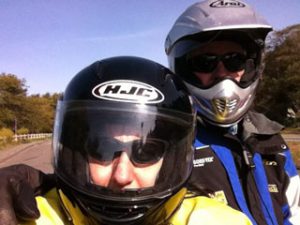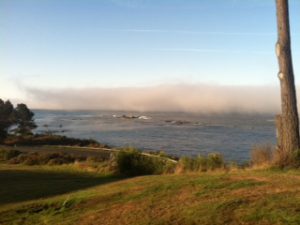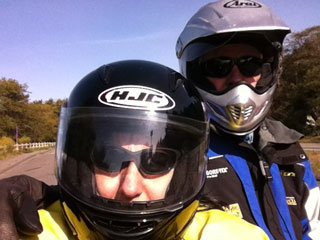 My husband and I recently finished a 2,200 mile motorcycle ride from Seattle, WA to Santa Fe, NM. Our journey was part vacation and part intervention for my ongoing struggle with workaholism. On the back of the bike, all I could do was be in the moment.
My husband and I recently finished a 2,200 mile motorcycle ride from Seattle, WA to Santa Fe, NM. Our journey was part vacation and part intervention for my ongoing struggle with workaholism. On the back of the bike, all I could do was be in the moment.
Without the constant stimulation of modern digital life bombarding me with offers and information, my point of comparison for personal happiness shifted to the present. Without the protection a train, plane, or automobile to shield me from contact with nature, I experienced all kinds of interactions.
To my surprise, the result was… joy. This led me to wonder:
Could a large part of our current financial angst be caused by false comparisons and a lack of true human connection?
 As we road down the coastline in Washington, Oregon, and Northern California we spent a great deal of time in sparsely inhabited terrain. For long stretches there was nothing to look at but the stunning beauty of the rocky coastline. When we would enter a town, the billboards, shops, and activity felt jarring next to the peace and quiet of the open road. After repeating this cycle several times, I noticed a pattern. I felt much more content in nature. The more posh or commercial the town we road through, the more thoughts of wants, unmet desires, and surprising needs would bubble up. By around the tenth time this happened I could see how complete I felt in nature – and how unknown material hungers arose in civilization.
As we road down the coastline in Washington, Oregon, and Northern California we spent a great deal of time in sparsely inhabited terrain. For long stretches there was nothing to look at but the stunning beauty of the rocky coastline. When we would enter a town, the billboards, shops, and activity felt jarring next to the peace and quiet of the open road. After repeating this cycle several times, I noticed a pattern. I felt much more content in nature. The more posh or commercial the town we road through, the more thoughts of wants, unmet desires, and surprising needs would bubble up. By around the tenth time this happened I could see how complete I felt in nature – and how unknown material hungers arose in civilization.
In modern life, we so often compare ourselves not just to the Joneses next door, but to the lives of the Catherine Zeta-Joneses…the rich and famous. When see the discrepancy, we feel lack. Yet as the data in this wonderful article by veteran journalist Scott Burns shows, 50% of households earn less than $33,000 a year and 75% of households earn less than $66,000 a year. By contrast, the “average” lifestyles portrayed in mainstream media would require incomes well into the six-digits to replicate. Yet you have to get to the top 5% of households before you start seeing regular incomes of $150,000 plus.
Modern digital life has flooded us with images of “average” lifestyles that are far beyond reach for the majority of people. So, we end up judging our success or happiness against images that are false comparisons.
As we turned inland and traversed through Nevada, Arizona, and New Mexico, I noticed another phenomenon. At virtually every gas station we stopped at people came up to talk to us about the bike, our trip, or just to say hello. I can’t remember the last time I just started talking to a random person when I pull my car up to my local gas station! There’s something about being out in the open on a bike that inspires people to come over and chat the way a friendly dog in a park might encourage you to come over and pet him. We had some delightful conversations. Invariably after a pleasant exchange, I felt a sense of calm connection washing over me that is sorely lacking in my normal workdays.
We spend so much of our time enclosed in various modes of transportation and attached to digital devices that raw, spontaneous human connection has become a rarity. Lacking that emotional nourishment, we fill ourselves up in other ways: shopping, consuming, striving, and achieving. Stagnating happiness levels may well be the result.
Have you noticed places in your own life where you’d like to let go of making comparisons and cultivate deeper connections with others? If so, would your spending patterns change at all?

